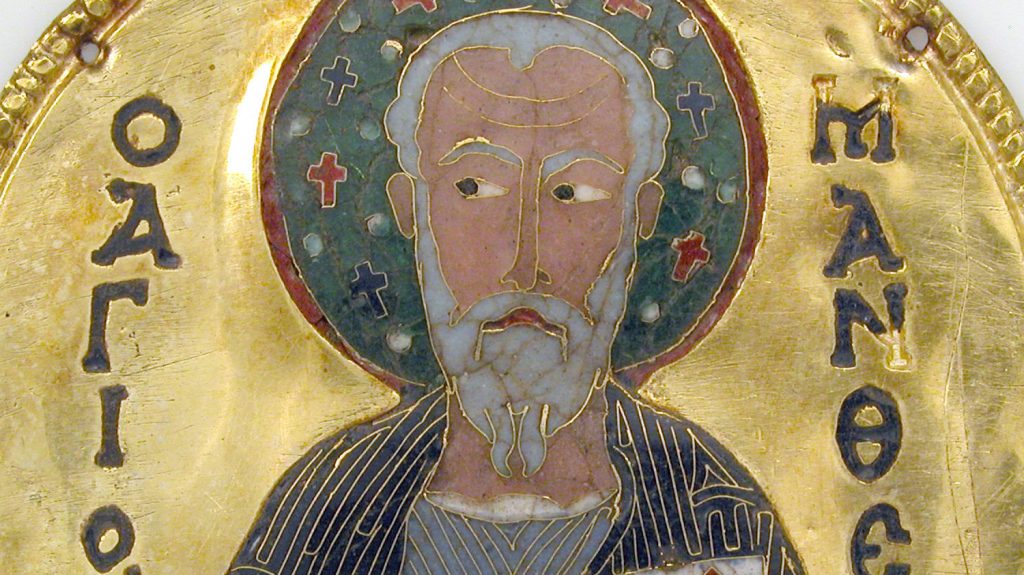Today is St Matthew’s Day. A tax collector for the Romans, Matthew (above) abandoned his unpopular job when Jesus called him to ‘follow me’. He is traditionally believed to have written the first of the four Gospels, and he is the patron saint of security guards and stockbrokers. In medieval England, St Matthew’s Day was believed to herald the start of bad weather, when you need to shut up the bees snug in their hives. Matthew’s relics are said to lie in the crypt of Salerno Cathedral in Italy, where there will be big processions today in honour of the town’s patron saint.
St Mathee shut up the bee;
St Mattho, take thy hopper and sow;
St Matthy all the year goes by;
St Matthie sends sap into the tree.
St Matthew’s Day rhyme, early English almanac
Today in 1664, Margaret Fell, the ‘nurturing mother of Quakerism‘, was put on trial for the crime of holding religious meetings in her home. Sentenced to imprisonment, she wrote many letters and pamphlets, including Women’s Speaking Justified, an early argument from biblical texts for women’s leadership, including the observation that Mary Magdalene had been the first person to ‘preach the tidings of the resurrection of Jesus’. Five years later, after her release from prison, she married George Fox, founder of the Quakers.
‘And how are the men of this generation blinded, that endeavour to stop the message and word of the Lord God in women, by condemning and despising of them? But all this opposing and gainsaying of women’s speaking hath risen out of the bottomless pit and spirit of darkness that hath spoken for these many hundred years together in this night of apostacy.’ Margaret Fell, Women’s Speaking Justified, 1666
Tonight in 1823, Joseph Smith, founder of the Church of Latter-Day Saints, had already gone to bed when he felt the need to pray. According to his account, as he was calling on God, a light as bright as noonday filled his room, and an angel in brilliant white robes floated above his bed. Moroni, the angel, told Smith that he was about to discover a book written on gold plates. The book, which Smith eventually recovered and deciphered, turned out to be the Book of Mormon.
‘He said there was a book deposited, written upon gold plates, giving an account of the former inhabitants of this continent, and the source from whence they sprang. He also said that the fulness of the everlasting Gospel was contained in it, as delivered by the Savior to the ancient inhabitants.’ The History of Joseph Smith, the Prophet, 1:34
Girolamo Savonarola, the fiery prophet and would-be church reformer, was born today in 1452, half an hour before sunset, in Ferrara, northern Italy. As a teenager, while other young men were penning love poems, he brooded at home, strummed sad songs on his lute, and wrote angsty poems such as ‘The ruin of the world’, satirising the sins of his time and the corruption of the Church. His lyrics could have been straight out of his later sermons, and he had already found his life’s mission.
God’s enemies are held in high esteem
While Cato goes begging.
Power has fallen into pirates’ hands
While St Peter is overthrown.
Here lust and greed abound!
How is heaven not enraged?
Girolamo Savonarola, ‘The ruin of the world’
Meanwhile, another Girolamo, this time Girolamo Cardano, Renaissance mathematician, physician and astrologer, died today in 1576. He made a huge contribution to the development of algebra, but he was hot tempered and enjoyed a fight, and used his mathematical gifts to gamble at cards, dice and chess. He gained notoriety in 1570 by casting the horoscopes of Martin Luther and Jesus, and although the Inquisition couldn’t have cared less about Luther, they were very interested in heretics who insulted Jesus. They imprisoned Cardano in Bologna, and he was fortunate to be released after a few months. Six years later, he cast his own horoscope, predicting he would die today in 1576. This proved to be correct, but Cardano may have taken his own life to prove his point.
Image: The Met
